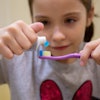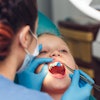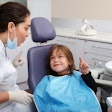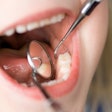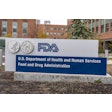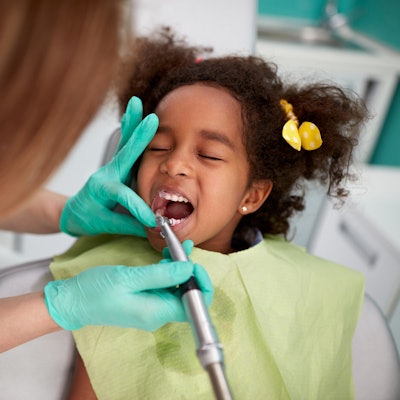
The COVID-19 pandemic has meant decreased access to pediatric dental care and will likely result in poorer oral health in children, according to a new editorial out of the U.K. Action on a national scale is needed to reverse the decline.
There has been an increase in caries and an overall increase in tooth extractions requiring general anesthesia among children, particularly in socioeconomically disadvantaged communities, as a result of the pandemic, noted the authors in BMJ Paediatrics Open (January 22, 2021).
Lead author Dr. Ifeanyichukwu Okike, of University Hospitals of Derby and Burton National Health Service (NHS) Foundation Trust, and colleagues charged that little consideration has been paid to pediatric oral health in the U.K. since the start of the pandemic. The default position has been to leave the responsibility solely to dental professionals when other healthcare workers could play a part, they wrote.
In response to the lockdown, the chief dental officer in England recommended that routine, nonurgent dental care be stopped and deferred. The authors of the editorial pointed out that this recommendation has resulted in the interruption of routine care in child dental services, including for infants who would have been eligible for their first dental visit.
Caries affects 23% of children age 5 years in England, and the incidence of tooth decay represents a measure of health equality as the incidence is twofold the rate in deprived communities compared to nondeprived communities, the authors wrote.
Despite oral health being a focal point in the Royal College of Paediatrics and Child Health's 2020 child health report, child oral health was not mentioned in a recent publication highlighting the indirect effects of COVID-19.
And when health services resumed in June of 2020, capacity to see patients in the NHS general dental practice was restricted.
Moreover, health visit and school nursing duties have been suspended because of the pandemic, and in many regions of the U.K., these duties are held by workers who play a critical function in providing counseling about oral health to high-risk families.
Public health initiatives such as the Dental Check by One campaign in the U.K. created momentum in the fight against dental caries, and the impact of COVID-19 endangers halting that momentum.
Research points to reduced oral health literacy among parents being linked to dental caries, and a push for greater oral health literacy among parents and caregivers would help combat dental caries in high-risk children, the authors noted.
Fluoridation of the water supply in the U.K. is another measure that would decrease the incidence of cavities -- currently only 14% of the supply is fluoridated, they pointed out.
Still another strategy is to tackle oral health in public policy. Public health research in England has found that overweight or very overweight children face a significantly elevated risk of dental caries, even after controlling for confounding factors such as ethnicity and water fluoridation status. Therefore, tackling obesity and oral health in a national strategy would be an optimal endeavor.
As children go back to school in the U.K., school-supervised toothbrushing should be resurrected to assist in establishing mouth-care regimens, the authors suggested.
They noted that extractions in pediatric dentistry bear an annual cost of 36 million British pounds ($49 million U.S.). With such a hefty price tag, the authors concluded that caries prevention and prioritizing oral health on the national stage is clearly a worthwhile objective.
